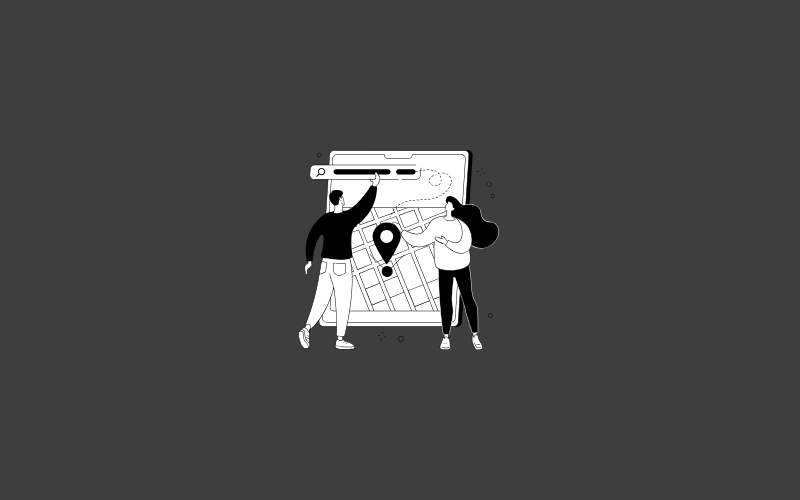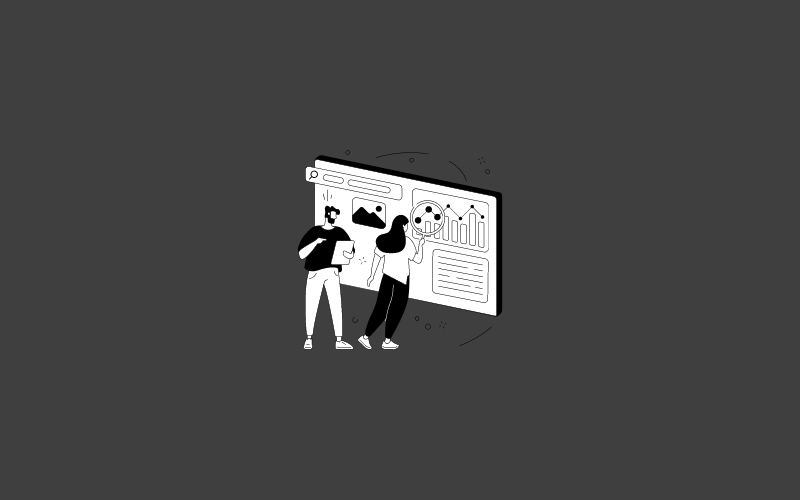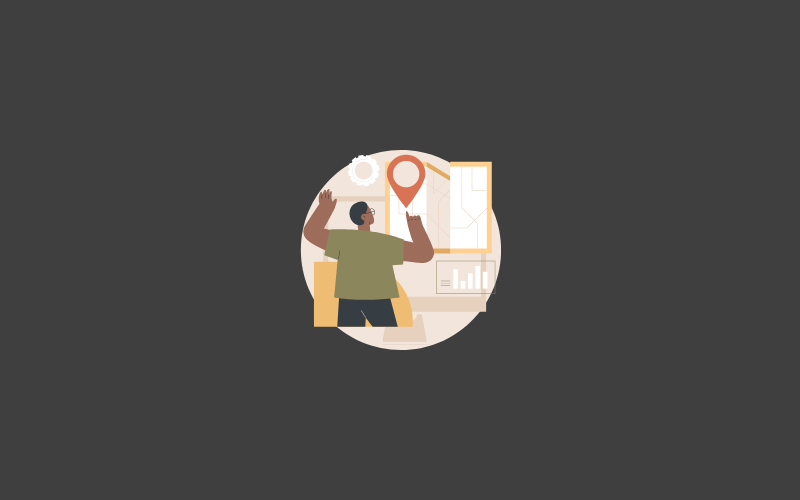Are you thinking of starting your own business online? An AI SEO agency might be the smartest move you can make.
Companies around the globe are shelling out around $79 billion on SEO, demanding to be the king of search engine results pages.
Some SEO agencies are collecting up to $18 million annually! With the integration of AI, you can speed up and automate the whole process to build a 6 figure agency.
If you’re considering this path, you’re in the right place. As someone present in this industry for years now, I’ll explain how to start an AI SEO agency in this guide.
I’ll walk you through the key SEO services you should offer and how to set up your operations with AI tools.
I’ll also talk about tackling hurdles, spreading the word about your new project, keeping your clients happy, and returning for more.
Understanding the Landscape of AI in SEO
When I first got into SEO, “AI” was something you’d hear in a movie, not in marketing talks. Now, the scene has shifted.
Blending artificial intelligence with SEO isn’t merely a novel concept—it’s essential for any SEO agency wanting to excel.
Why AI Matters in SEO?
AI’s rapid analysis and trend-spotting strength give your SEO strategies a real edge. It works faster and more accurately than any human can.
This lets you get ahead of other agencies still using dated methods. Consider giving your clients quick, precise results—like offering water in a desert.
The Fusion of AI and SEO
Consider the combination of AI and SEO as crafting a power combo. SEO focuses on optimizing for better rankings on search engines, while AI shines in automating tasks and sorting data.
Merge these, and you’ve got streamlined, and you’ll make data-driven decisions and strategies that remove the guesswork from SEO.
You can automate routine tasks like gathering data and rapid analysis. This frees up your expert team for crucial activities like planning and executing SEO campaigns.
What Does This Mean for Your Agency?
Using AI in your SEO agency isn’t just a cool extra—it’s a unique feature that can make you stand out in a crowded field.
The data-driven strategies AI can empower you with are invaluable, potentially resulting in happier clients inclined to stick with your services nonstop.
What do Businesses Expect When Engaging with an AI SEO Agency?
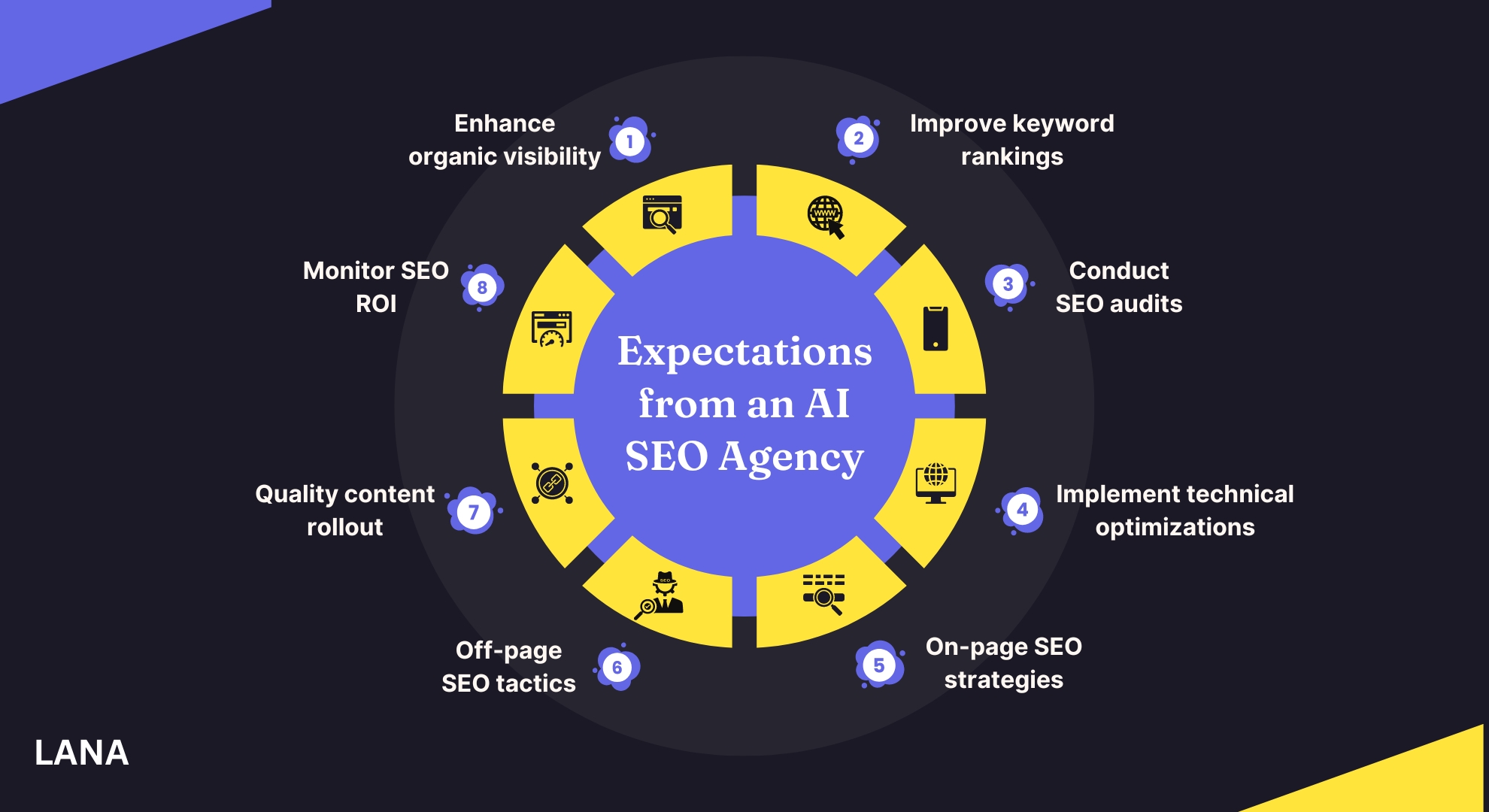
Businesses have various objectives, from enhancing organic visibility and keyword rankings to boosting their site’s domain rating and attracting inbound clients.
So, they seek an SEO agency proficient in achieving these targets. To kick off an AI SEO agency, you need the expertise to fulfill these expectations:
- Carry out SEO audits
- Conduct competitive keyword research
- Run a keyword gap analysis
- Implement technical optimizations on the site
- Execute on-page and off-page SEO strategies
- Manage local and international SEO
- Optimize and roll out top-quality content
- Construct high-value backlinks for the client’s website
- Evaluate any drawbacks impacting the client’s site
- Keep tabs on ROI from the SEO campaigns and report outcomes to clients
Every client wants results, and ensuring your expert team can deliver on all these key areas is vital for your agency’s SEO success.
How to Build an AI SEO Agency – Step-by-Step Guide
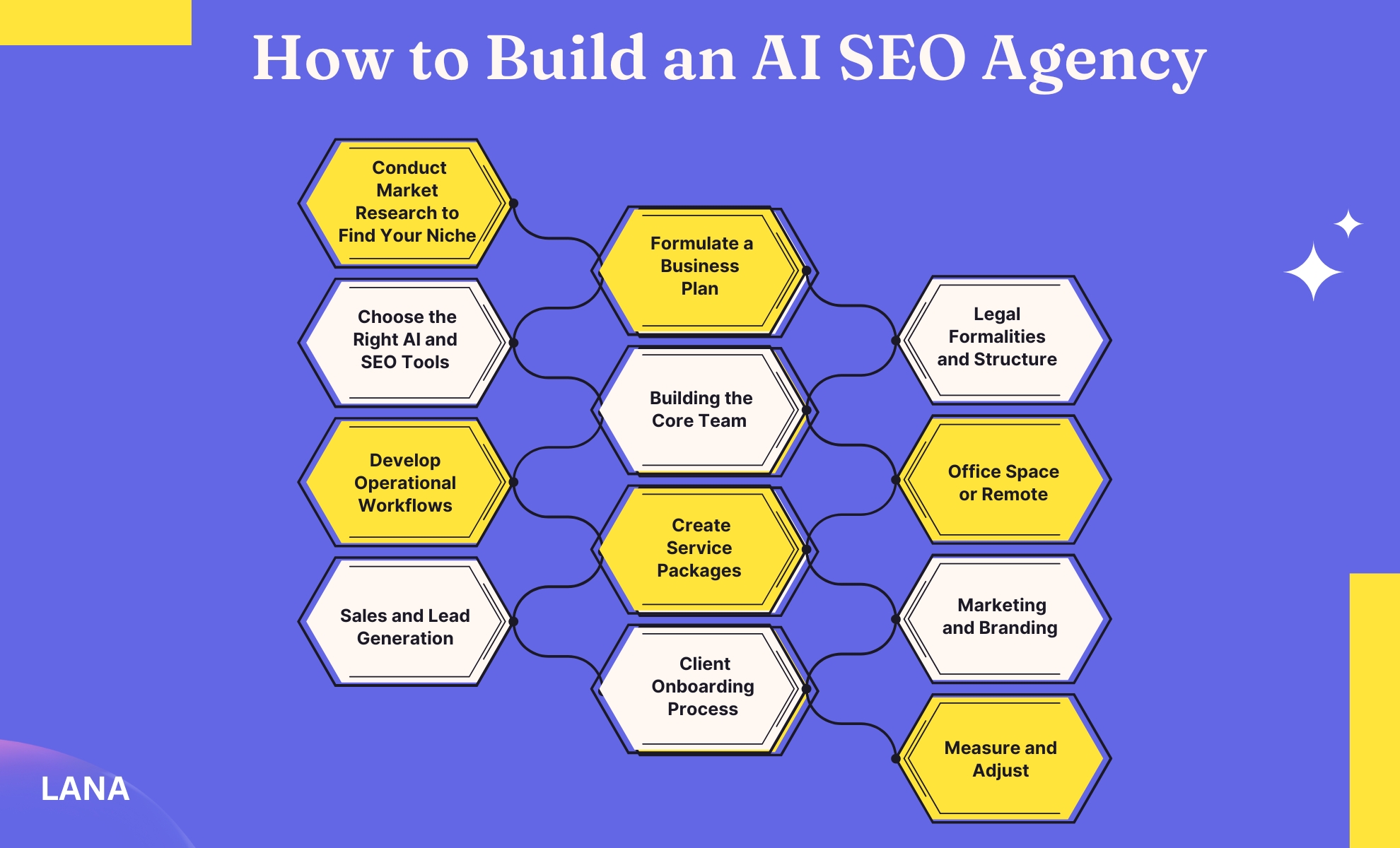
The path to major actions starts with the first move—or, in my situation, with thorough planning, precise strategy, and a unique offering that sets your AI SEO agency apart.
If you’re ready to make your dream a reality, let’s review the crucial steps to create your agency from the ground up.
Step 1: Conduct Market Research to Find Your Niche
Before even dreaming of launching, you must grasp the field you’re entering.
Market research isn’t a formality; it’s about knowing your audience and how to outperform competitors in serving them.
Use tools like Google Trends to measure niche interest. Also, engage in industry webinars, connect with likely clients, and be active in relevant online circles.
Identify their challenges and consider how your AI SEO agency can address them.
Step 2: Formulate a Business Plan
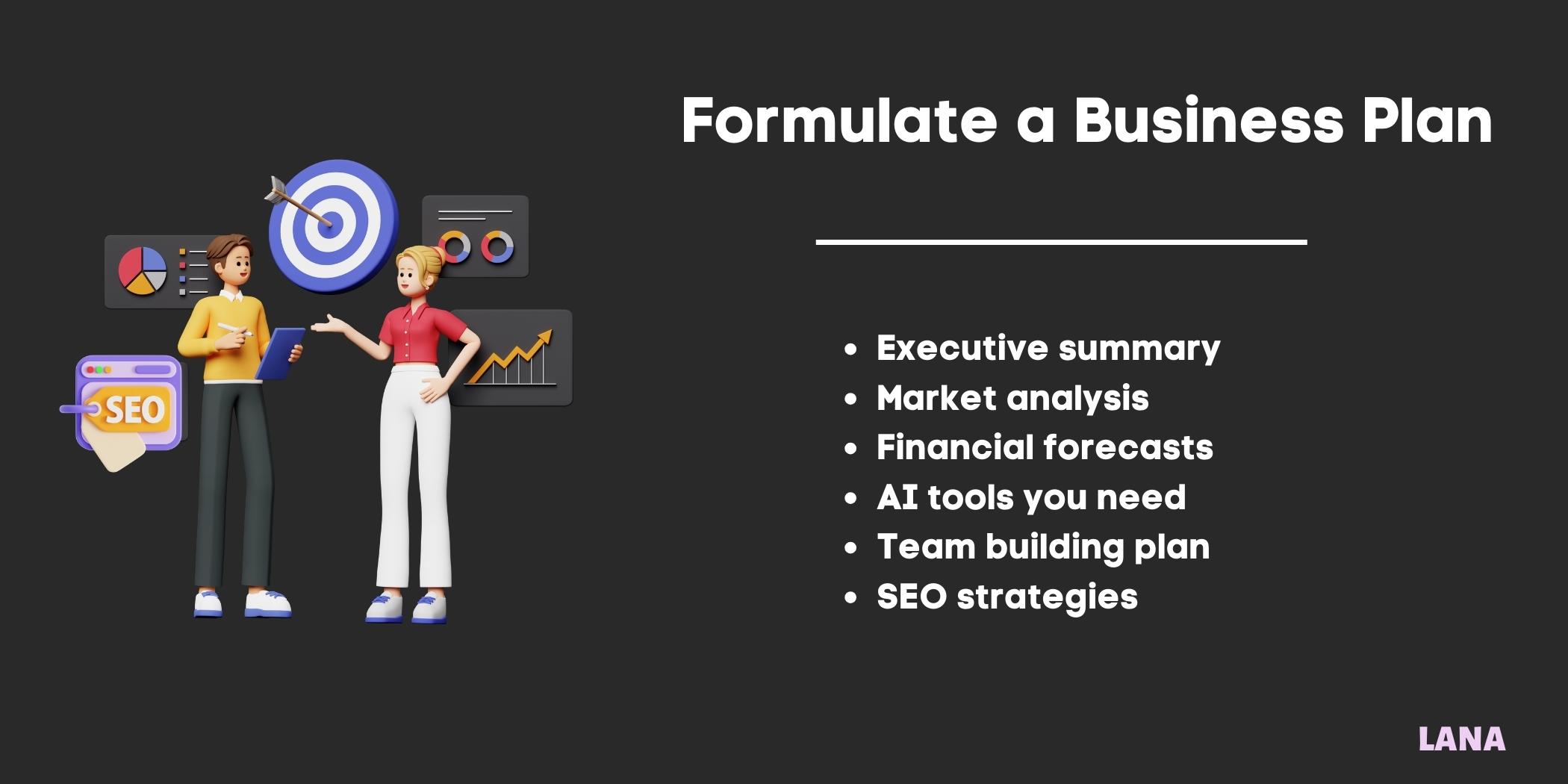
A business plan serves as your guiding star. Here, you figure out your revenue streams, the team you need, and the type of clients you aim to pull in.
It’s more than paperwork; it’s your projected future in practical terms. Make sure your business plan is flexible to adapt as circumstances shift.
Statistically, startups with a business plan have a 16% higher chance of success than those without one.
Sections to Include
- Executive summary
- Market analysis
- Financial forecasts
- AI tools you need
- Team building plan
- SEO strategies
Keep it a dynamic document, consistently updated as the business matures.
Step 3: Legal Formalities and Structure
Legal issues can set you up for success or lead to your downfall. According to the US Small Business Administration, compliance with laws and regulations is third place for small business challenges.
Consult a lawyer to determine your business form—a sole proprietorship, LLC, or corporation.
- To-Do: Register the business name, acquire a federal EIN, and secure any needed permits or licenses.
- Legal Help: Platforms like LegalZoom can handle basic needs, but consult a specialized lawyer for complicated issues.
Step 4: Choose the Right AI and SEO Tools
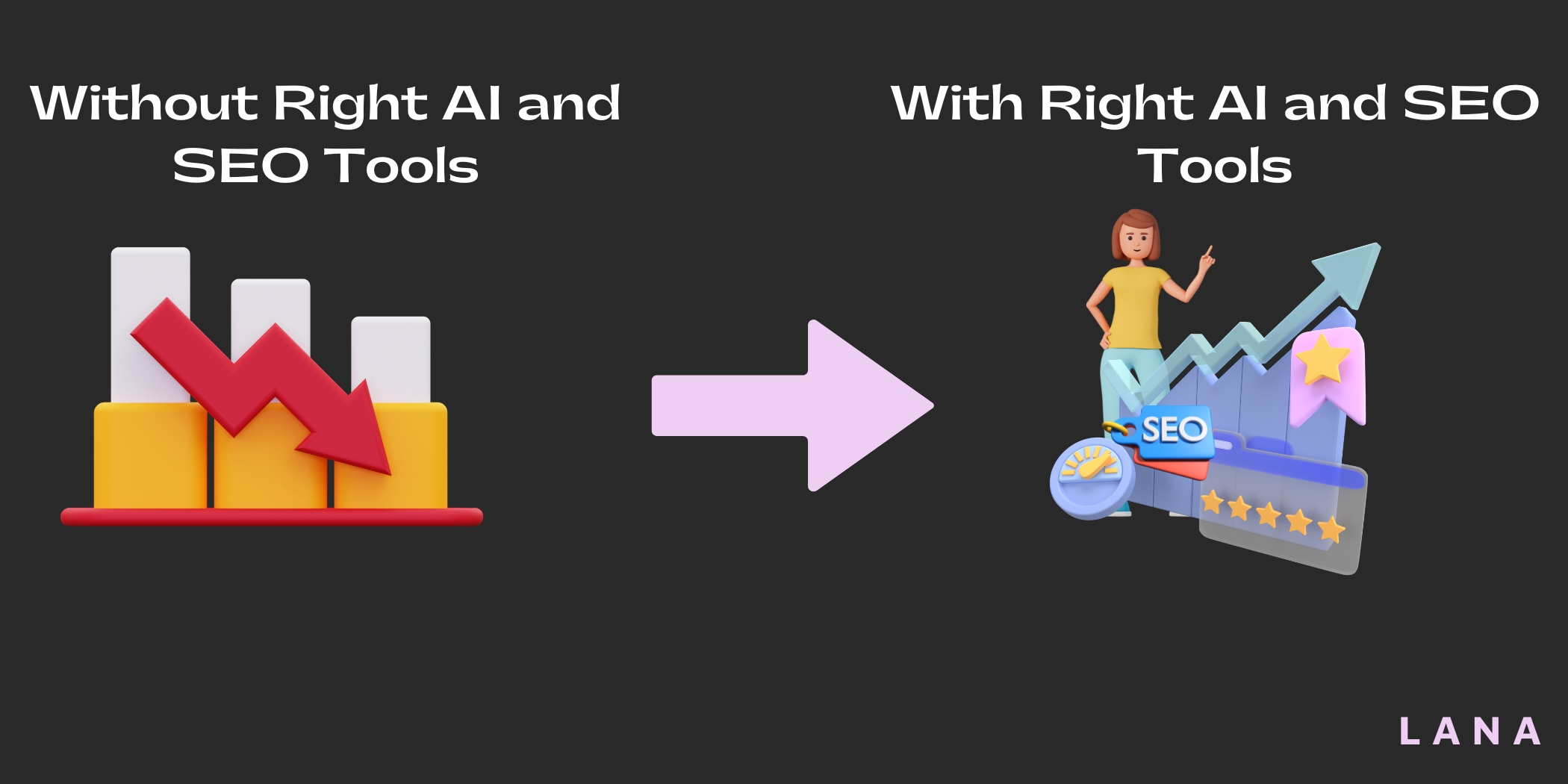
You wouldn’t go to a construction site without a hammer, right? Picking the right AI and SEO tools is crucial.
This is where traditional SEO services integrate with cutting-edge AI SEO tools.
Whether it’s TensorFlow for machine learning or Ahrefs for SEO audit, your toolkit should have the best from both realms.
Step 5: Building the Core Team
Solo efforts won’t cut it. You’ll need SEO specialists proficient in keyword research, AI experts adept at algorithm navigation, and content creators capable of generating compelling stories.
Search for these talents where they frequent, such as niche job boards or LinkedIn.
Step 6: Office Space or Remote?
Your work setting influences your team’s culture. Be it the communal energy of a co-working venue or the convenience of remote work, choose what aligns with your business goals.
Step 7: Develop Operational Workflows
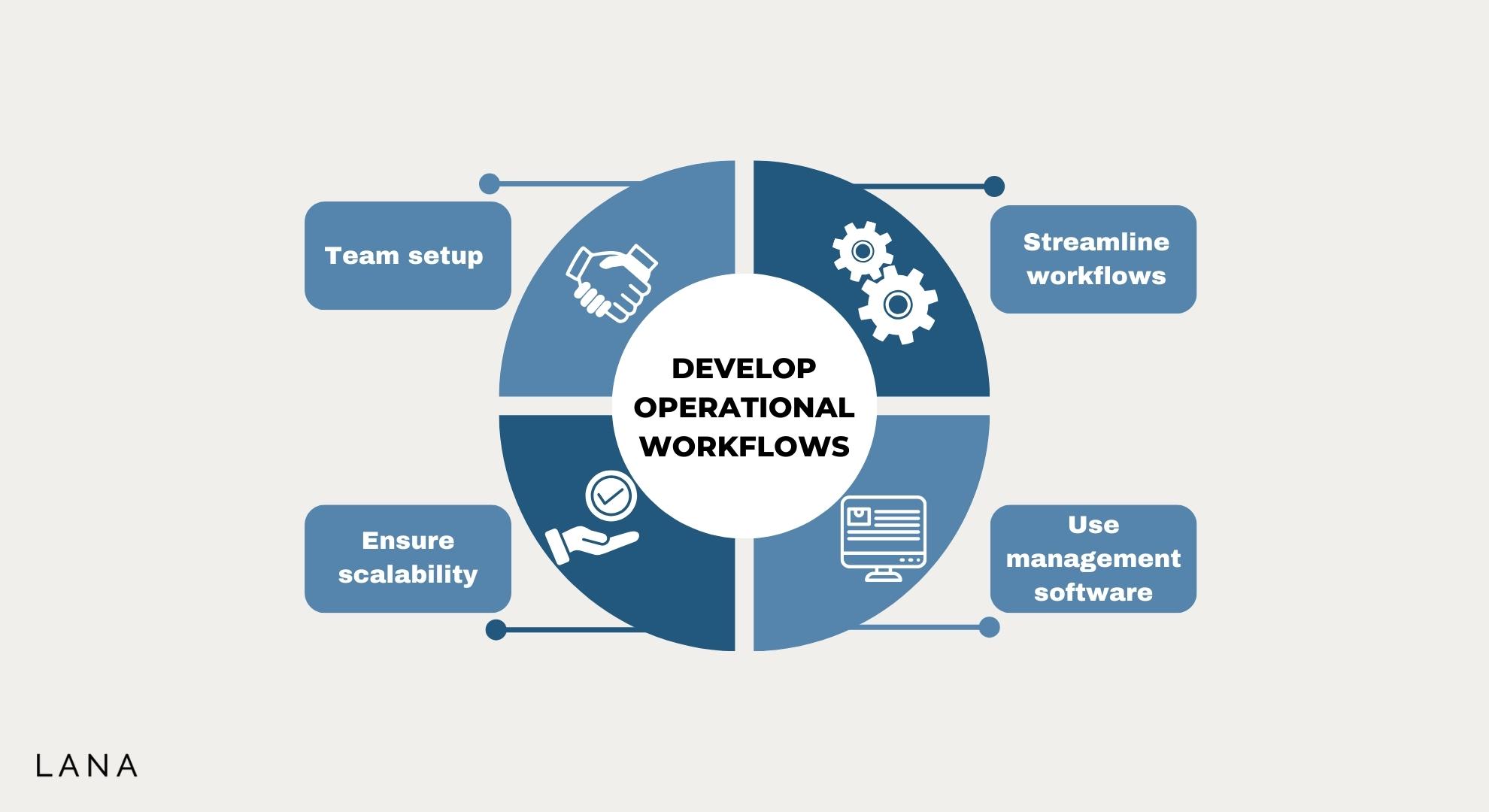
With your team and tools in place, your next move is to streamline workflows.
Use project management software to allocate tasks, monitor progress, and hit deadlines. Regulate processes to ease future scalability.
Step 8: Create Service Packages
The way you package your AI SEO services can be a game-changer. Consider combinations like SEO audits, content optimization, or backlink analysis alongside keyword research.
Innovate packages that provide multi-faceted solutions to your clients.
Step 9: Marketing and Branding
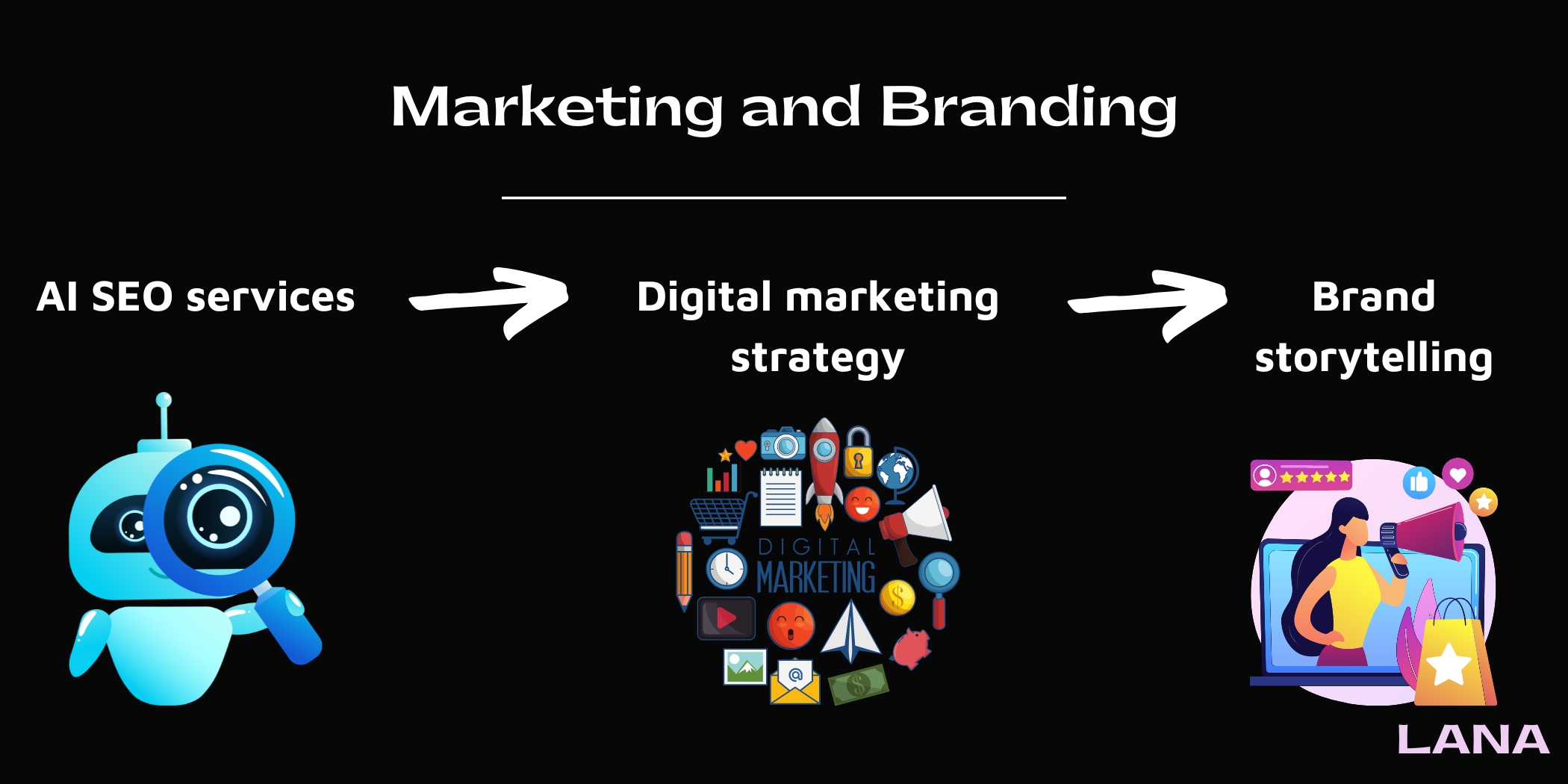
The world needs to know you offer top-notch AI SEO services. Draft a digital marketing strategy employing social media, a blog, and potentially some pay-per-click ads.
Using AI for marketing can add another layer of accuracy to your campaign. Your brand should narrate a convincing story, highlighting your prowess in AI SEO solutions.
Step 10: Sales and Lead Generation
An exceptional marketing campaign cannot replace direct engagement in the sales process. Create a lead generation plan extending beyond cold emails and calls.
Consider offering a complimentary webinar or an informative eBook to entice prospective clients. Once they’re hooked, you can proceed to close the deal.
👉Pro Tip: Use AI email generator tools to craft compelling cold emails, increasing your chances of getting a response.
Step 11: Client Onboarding Process
The first few weeks with a new client are critical. You need a smooth onboarding process to make them feel valued and important.
A welcome package, clear communication channels, and a roadmap of what they can expect will set the tone for a fruitful relationship.
According to Bain & Company, a 5% increase in customer retention rates boosts profits by 25% to 95%.
Step 12: Measure and Adjust
Success is ever-changing. Strategies that were delivered yesterday may pause today. Use data-driven tools like Google Analytics to assess website traffic and SEMrush to gauge SEO success.
You must utilize:
- Analytics Tools: Turn to Google Analytics for insights into site traffic and SEMrush for monitoring SEO outcomes.
- KPIs: Identify essential performance metrics such as client acquisition costs, lifetime value, and ROI on SEO campaigns.
Tackling the Challenges Head-On
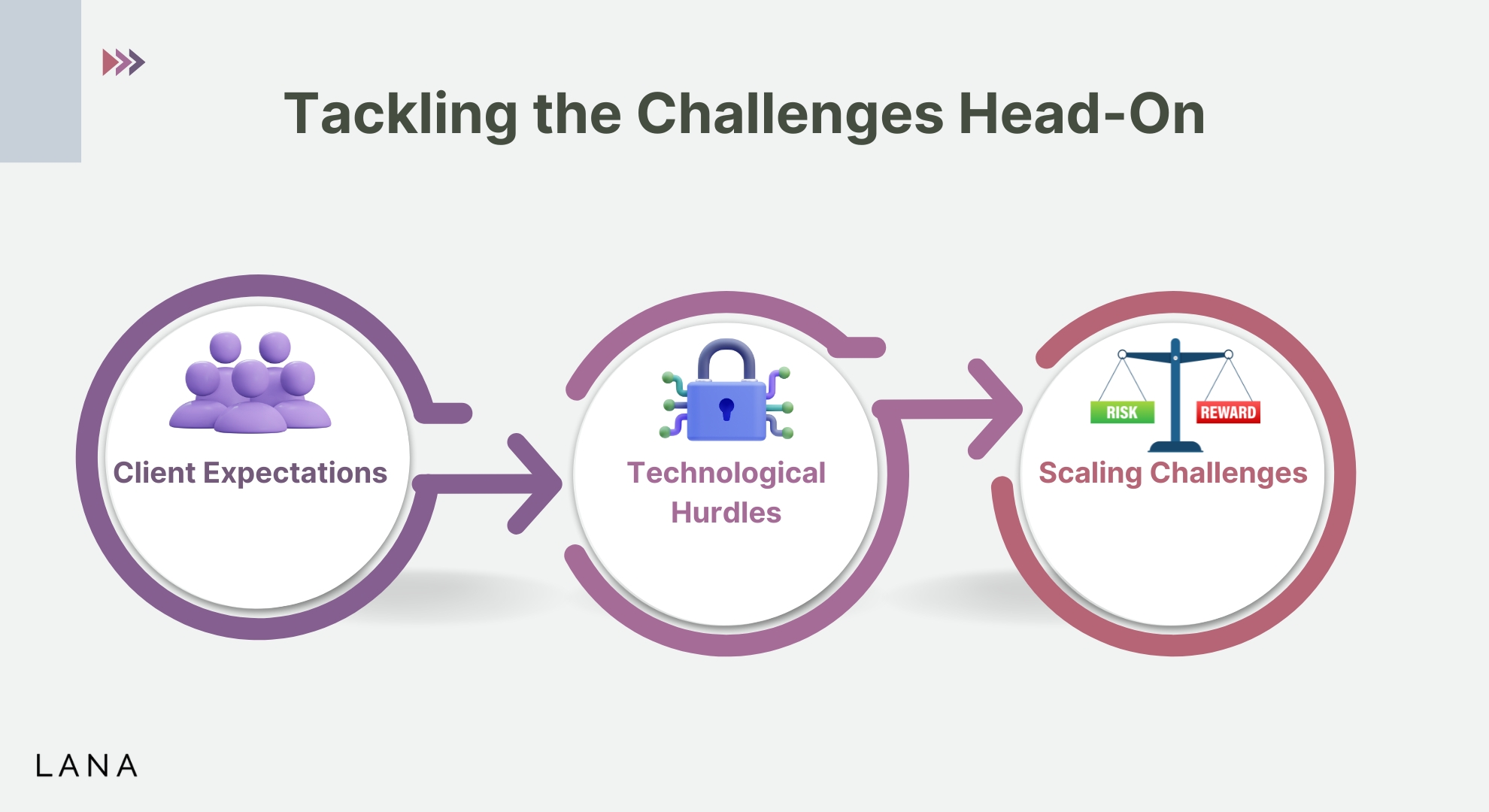
Starting an AI SEO agency journey takes a lot of work. It’s a complex ground filled with its own set of hurdles.
But that’s alright because navigating through these challenges differentiates the successful from the rest.
Common Obstacles and How to Overcome Them
The digital realm is packed with hurdles that even experienced folks find overwhelming. 61% of businesses indicate their top marketing issue is driving traffic and leads.
Here are some common hurdles you may face:
- Client Expectations: Sometimes, clients want big results but offer small budgets. Clear communication is crucial to set expectations from the beginning.
- Technological Hurdles: AI is ever-changing. Staying up to date with new trends and software is essential, or you need to catch up.
- Scaling Challenges: Rapid growth may compromise service quality. Utilize project management tools like Asana or Trello to maintain balance.
Marketing Your AI SEO Agency
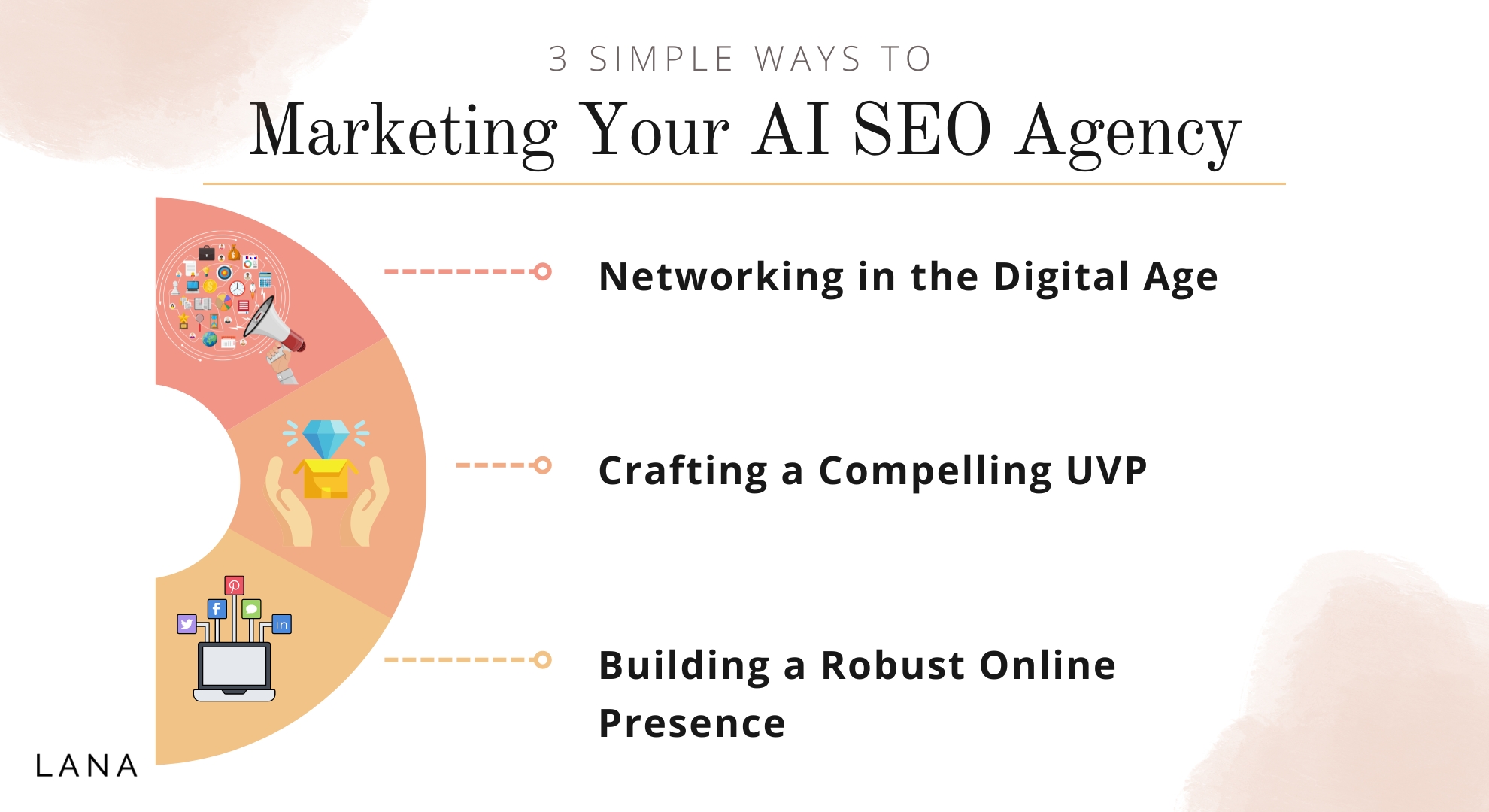
You might run the most innovative AI SEO agency, but if no one knows your existence, you might not exist. Your marketing efforts are like a huge speaker speaking to the entire world.
Networking in the Digital Age
Building professional relationships involves more than just exchanging business cards at conferences; it also involves making digital connections. 80% of industry professionals see networking as crucial for career growth.
You can do networking through:
- LinkedIn: It needs to be more than just adding contacts; actively engage with them. Consistent posting and updates can keep you visible in their feeds.
- Virtual Events: The COVID-19 pandemic underscored the impact of online gatherings like webinars and meetups, a trend that is likely to persist.
Crafting a Compelling UVP (Unique Value Proposition)
Your Unique Value Proposition (UVP) is not just a catchy phrase; it’s a commitment to your client. Your UVP is what will set you apart.
Your UVP should be straightforward and free of jargon and slogans. What unique issue are you resolving that others cannot?
Make this the focal point of your UVP.
Building a Robust Online Presence
Your website acts like a salesperson that never sleeps. Your site should be a perfect example of SEO best practices. Be where your potential clients are on social platforms like Twitter and Instagram.
Content marketing makes three times more leads than traditional marketing and is 62% cheaper. Make great blogs, whitepapers, and marketing videos.
Consider using tools like Jasper AI or Writesonic for quality content creation. For marketing videos, leverage the capabilities of free AI video generators.
Then, you can utilize AI text-to-voice generation with Uberduck AI for your videos. Tools like these can save time and improve quality.
Future-Proofing Your Agency

In the digital age, standing still is the quickest path to becoming old-fashioned. You need to think long-term even as you manage the immediate challenges. So, how do you accomplish that?
Staying Updated with AI and SEO Trends
Staying on top of AI and SEO trends is a mix of being curious and having a plan. You need to know what’s changing and new.
- AI Journals and Websites: Make it a daily habit to read the latest stuff out there. This can be your morning routine.
- Industry Newsletters: Instead of wasting time, use your email to learn. Sign up for newsletters that keep you in the loop.
- Friends in the Field: Talk to people who are experts in AI and SEO. They can give you insights you might not find elsewhere.
Investing in Continuous Learning and Development
When I began my AI SEO business, it became clear quickly that your first skills are just a starting point. You have to keep getting better.
There are plenty of online places to learn; you can pick courses that fit your needs when you have time.
I can’t count the moments I’ve had during a training session. It’s a great way to learn and meet people simultaneously.
Final Thoughts
I had no idea what to expect when I first decided to launch my own AI SEO agency. But the journey has been incredible.
Using a mix of AI and SEO tools made tasks like keyword research and site audits a breeze. The benefit? Time saved and deeper insights into what works.
If you’ve been thinking about getting involved in this field, take it from someone who has already done so: you won’t regret it.
But remember, this industry is always changing. SEO and AI are evolving fast, so you must keep learning and adapting to stay ahead.
So, keep an eye out for the latest trends and tools. After all, a winning strategy today might be old news tomorrow. Stay curious, and you won’t just survive—you’ll thrive.
Frequently Asked Questions
What is an AI SEO agency, and how is it different from a regular SEO agency?
An AI SEO agency uses AI-powered SEO software to boost normal SEO tactics. This can mean a better understanding of data, guessing future trends, or doing tasks automatically.
It adds extra skills that regular SEO companies might not have.
How much money do you need to start an AI SEO Agency?
The cost to start can change a lot based on how big you want to go. At the least, you’ll need money for AI SEO tools, employees, and getting the word out. Make a good business plan to know your costs better.
Can I start an AI SEO agency by myself?
Sure, I began alone, and you can too. At first, you’ll need to do many jobs—be the SEO pro, the AI expert, and the one who makes sales until you can hire more people.
What are the key tools needed for running an AI SEO agency?
You’ll need different tools, from AI SEO strategy software to basic SEO tools. Managing customer info and tasks is also key.
Select the tools that work for your needs and what you can afford. I started with some free and some paid tools.
How do I get my first customers?
Being social online and in person helps a lot. Also, a strong message about why you’re different and a good online look can boost your organic traffic.
Happy clients told their friends about me, so aim to wow your clients for more work.

About The Author
Lana is a full time content creator, blogger, and SEO strategist. She coaches up-and-coming bloggers over at Blog Growth Engine and helps select SaaS startups with their SEO and content strategy. Before starting this blog, Lana was the VP of Engineering at an AI startup and a Data Scientist for over 6 years. She also holds a Bachelor of Science Degree in Statistical Data Science from the University of California, Davis. Follow LanaGerton.com to learn how she blends data-driven approaches and AI technology into her content creation and SEO frameworks.


